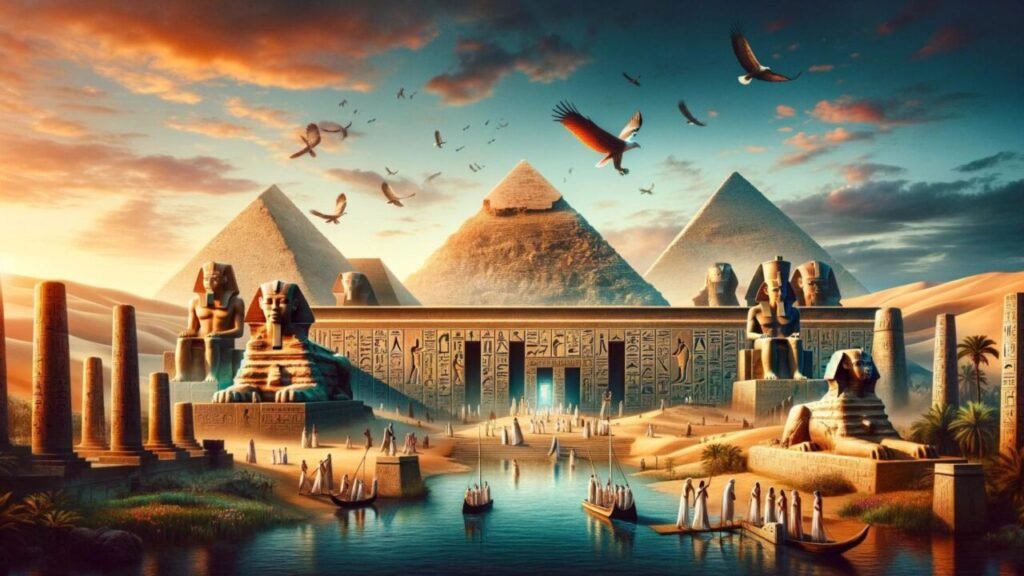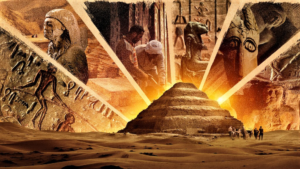The Ancient Egyptian Civilization (c. 3100–30 BCE) is one of the most fascinating and influential cultures in human history. With its iconic pyramids, enigmatic sphinx, and a pantheon of gods and goddesses, this civilization has captured the imaginations of people for centuries. But what was life really like in Ancient Egypt? Let's dive in and explore this remarkable period in history.
The Dawn of Ancient Egypt
The Birth of a Civilization

Ancient Egypt officially began around 3100 BCE when the Upper and Lower regions were unified by the legendary King Menes (also known as Narmer). This unification marked the beginning of the Early Dynastic Period. Imagine two previously separate lands coming together, like the merging of two mighty rivers, setting the stage for a powerful and enduring civilization.
Geography and the Nile River
Egypt’s geography played a crucial role in its development. The Nile River, often referred to as the lifeblood of Egypt, provided fertile soil for agriculture due to its annual inundation. Picture a giant, natural irrigation system turning arid desert into lush farmland. The river was also a highway for transportation, facilitating trade and communication.
Pharaohs and Society
The Role of the Pharaoh
The pharaoh was not just a king but was considered a god on earth. Imagine living in a society where your ruler was seen as a divine being, bridging the human world and the gods. The pharaoh's primary responsibilities included maintaining ma'at (cosmic order), conducting religious rituals, and leading military campaigns.
Social Structure
Egyptian society was highly stratified. At the top were the pharaoh and his family, followed by nobles, priests, and scribes. Farmers, laborers, and slaves were at the bottom. Think of it as a pyramid, with each layer representing a different social class, all supporting the divine ruler at the top.
Architectural Marvels
Pyramids of Giza
When we think of Ancient Egyptian Civilization (c. 3100–30 BCE), the pyramids of Giza immediately come to mind. Built during the Old Kingdom, these structures were tombs for pharaohs like Khufu, Khafre, and Menkaure. These colossal monuments, built with precise engineering and immense labor, were designed to ensure the pharaoh’s safe passage to the afterlife.
Temples and Monuments
Egyptians were master builders. Temples like Karnak and Luxor were not just places of worship but also administrative centers. Imagine vast stone edifices adorned with intricate hieroglyphics and towering columns, all constructed to honor the gods and the pharaohs.
Religion and Mythology
Pantheon of Gods
Religion was central to Egyptian life. They worshipped a multitude of gods and goddesses, each with specific roles and attributes. Think of it as a divine family tree, with deities like Ra, the sun god, and Isis, the mother goddess, influencing every aspect of daily life.
The Afterlife
Egyptians believed in an elaborate afterlife. They thought that life on earth was just a part of an eternal journey. The Book of the Dead, a collection of spells and instructions, was created to guide the deceased through the perilous underworld to reach the Field of Reeds, a paradisiacal version of Egypt.
Daily Life in Ancient Egypt
Agriculture and Food
Agriculture was the backbone of the economy. Thanks to the Nile, Egyptians grew crops like wheat, barley, and flax. Picture fields of grain swaying in the breeze, with farmers working diligently to harvest the bounty. Bread and beer were staples of the Egyptian diet, while fish and vegetables supplemented their meals.
Clothing and Adornment
Egyptians were known for their distinctive clothing. Men wore kilts, while women donned straight dresses. Linen was the fabric of choice, due to the hot climate. Imagine yourself in a simple yet elegant linen outfit, perhaps adorned with jewelry made of gold and semi-precious stones.
Achievements in Science and Medicine
Advancements in Medicine
The Egyptians were pioneers in medicine. They practiced surgery, dentistry, and had an extensive knowledge of medicinal plants. Think of them as the early doctors, diagnosing and treating ailments with surprisingly sophisticated methods.
Contributions to Mathematics and Astronomy
Egyptians made significant strides in mathematics and astronomy. They developed a calendar based on the lunar and solar cycles, essential for agricultural planning. Picture ancient astronomers studying the night sky, their observations leading to the creation of a system that influenced future civilizations.
Writing and Literature
Hieroglyphics
Hieroglyphics, the writing system of ancient Egypt, combined logographic and alphabetic elements. Imagine a complex script with over 700 symbols, each representing sounds, objects, or ideas. These were meticulously inscribed on monuments, tombs, and papyrus scrolls.
Literary Works
Egyptian literature included religious texts, such as the Pyramid Texts, as well as secular works like The Tale of Sinuhe. These writings offer insights into their beliefs, values, and daily life. Think of them as windows into the minds and hearts of people from a distant past.
Decline and Legacy
The Fall of Ancient Egypt
The decline of Ancient Egyptian Civilization (c. 3100–30 BCE) began around the New Kingdom period. Factors such as invasions by foreign powers, internal strife, and economic difficulties weakened the state. Imagine a once-great empire slowly losing its grip, until it finally fell under Roman rule in 30 BCE.
Enduring Legacy
Despite its fall, the legacy of Ancient Egypt endures. Its art, architecture, and mythology have influenced countless cultures and continue to captivate people today. Think of modern movies, books, and even fashion drawing inspiration from this ancient civilization, keeping its memory alive.
Places to Visit
If you're ever in Egypt, there are some must-see sites that bring the history of Ancient Egyptian Civilization (c. 3100–30 BCE) to life:
- Giza Plateau: Home to the Great Pyramids and the Sphinx.
- Valley of the Kings: The burial site of many New Kingdom pharaohs, including Tutankhamun.
- Karnak Temple: A vast temple complex dedicated to the god Amun.
- Luxor Temple: Another impressive temple located on the east bank of the Nile.
- Abu Simbel: Rock temples commissioned by Ramses II.
Frequently Asked Questions
Q: What were the main achievements of the Ancient Egyptian Civilization (c. 3100–30 BCE)?
A: The main achievements include the construction of the pyramids, advancements in medicine and mathematics, and the development of a complex writing system known as hieroglyphics.
Q: Who was the most famous pharaoh of Ancient Egypt?
A: Tutankhamun, also known as King Tut, is one of the most famous pharaohs due to the discovery of his nearly intact tomb in 1922.
Q: What role did religion play in Ancient Egyptian society?
A: Religion was integral to all aspects of Egyptian life, influencing governance, daily activities, and their views on the afterlife.
Q: How did the Nile River influence Ancient Egyptian Civilization (c. 3100–30 BCE)?
A: The Nile provided fertile soil for agriculture, a means of transportation, and a source of sustenance, making it central to the civilization’s survival and prosperity.
Q: What caused the decline of Ancient Egyptian Civilization?
A: The decline was due to a combination of factors, including foreign invasions, internal conflicts, and economic troubles.
Conclusion
The Ancient Egyptian Civilization (c. 3100–30 BCE) remains a cornerstone of human history, offering insights into a world that was both advanced and deeply spiritual. From the grandeur of the pyramids to the intricacies of their religious beliefs, the achievements of this civilization continue to inspire awe and admiration. As we look back on this remarkable period, we gain a deeper understanding of the foundations upon which modern society is built. Whether you're a history buff or just curious about the past, the story of Ancient Egypt is sure to captivate and enlighten you.
4o


